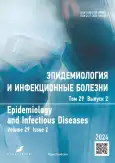Severe course of leptospirosis: A case report
- Authors: Efremov D.O.1, Khuramshin A.R.1, Beloborodov V.B.2
-
Affiliations:
- The National Medical Research Center of High Medical Technologies — the Central Military Clinical Hospital of A.A. Vishnevsky
- Russian Medical Academy of Continuous Professional Education
- Issue: Vol 29, No 2 (2024)
- Pages: 142-150
- Section: CASE REPORTS
- URL: https://journal-vniispk.ru/1560-9529/article/view/257364
- DOI: https://doi.org/10.17816/EID627890
- ID: 257364
Cite item
Abstract
This study describes a clinical case of severe leptospirosis. Patient K., was admitted to the neurosurgical department on November 26, 2023, with a diagnosis of “Closed craniocerebral injury dated 22.11.2023. Severe brain injury. Linear fracture of the occipital bone. Eyelid hematoma. An abrasion of the upper eyelid on the right.” On November 29, 2023, an objective examination drew attention to an increase in body temperature to 39.5°C, subictericity of the sclera and skin, and conjunctival injections. Hemorrhagic rash appeared on the skin of the trunk and limbs. The hemodynamics was unstable, with episodes of arterial hypotension. Laboratory examination revealed mild anemia, signs of hepatic–renal insufficiency, hyperbilirubinemia, and increased concentrations of creatine phosphokinase, C-reactive protein, and procalcitonin. Fluctuations in hepatic–renal insufficiency and levels of creatine phosphokinase and procalcitonin increased. In addition, the differential diagnostic search aimed at identifying the following infectious diseases: hemorrhagic fever with renal syndrome, leptospirosis, malaria, and viral hepatitis. IgM to Leptospira interrogans were detected (December 11, 2023). The patient received antibacterial therapy, extracorporeal detoxification, artificial ventilation, infusion therapy, and correction of the hemostasis system. With the complex treatment, the patient’s condition stabilized, and the patient was discharged from the hospital on the 61st day with restoration of health.
Full Text
##article.viewOnOriginalSite##About the authors
Dmitriy O. Efremov
The National Medical Research Center of High Medical Technologies — the Central Military Clinical Hospital of A.A. Vishnevsky
Author for correspondence.
Email: Efremov-d24@mail.ru
ORCID iD: 0000-0001-7889-6052
SPIN-code: 7115-2713
MD, Cand. Sci. (Medicine)
Russian Federation, KrasnogorskAinur R. Khuramshin
The National Medical Research Center of High Medical Technologies — the Central Military Clinical Hospital of A.A. Vishnevsky
Email: ainur83@inbox.ru
ORCID iD: 0009-0006-7956-4694
SPIN-code: 6195-3308
Russian Federation, Krasnogorsk
Vladimir B. Beloborodov
Russian Medical Academy of Continuous Professional Education
Email: belvb1070@mail.ru
ORCID iD: 0000-0002-0544-4167
SPIN-code: 4233-2046
MD, Dr. Sci. (Medicine), Professor
Russian Federation, MoscowReferences
- Gorodin VN, Moysova DL, Bakhtina VA, Zotov SV. Trends of Contemporary Leptospirosis (Review of Literature). Epidemiology and Infectious Diseases. 2018;23(2):93–100. (In Russ). doi: 10.18821/1560-9529-2018-23-2-93-100
- Trankvilevsky DV, Kiseleva EYu, Korzun VM, et al. Epizootiological and Epidemiological Situation on Leptospirosis in the Russian Federation over the Period of 2013–2022 and the Forecast for 2023. Problems of Particularly Dangerous Infections. 2023;(3):43–50. (In Russ). doi: 10.21055/0370-1069-2023-3-43-50
- Breneva NV, Balakhonov SV, Allenov AV, et al. Clinical and epidemiological features of leptospirosis in Siberia and the Far East. Infectious Diseases: News, Opinions, Training. 2018;7(3):62–67. (In Russ). doi: 10.24411/2305-3496-2018-13009
- Nechaev VV, Yarovayа II, Gorbunova IV, et al. Epidemiological, ecological and clinico-laboratory characteristics of hemorrhagic fever with renal syndrome in Saint-Petersburg and suburb. Journal Infectology. 2021;13(2):126–134. (In Russ). doi: 10.22625/2072-6732-2021-13-2-126-134
- Fesenko NV, Abdubalieva AA. Clinical case of unicteric form of leptospirosis. Vestnik of KSMA named after I.K. Akhunbayev. 2018(3):62–64. (In Russ). EDN: MAPCAP.
- Costa F, Hagan JE, Calcagno J, et al. Global morbidity and mortality of leptospirosis: a systematic review. PLoS Neglected Tropical Diseases. 2015;9(9):e0003898. doi: 10.1371/journal.pntd.0003898
- Goarant C. Leptospirosis: risk factors and management challenges in developing countries. Research and Reports in Tropical Medicine. 2016;7:49–62. doi: 10.2147/RRTM.S102543
- Verma V, Goyal M, Kala D, et al. Recent advances in the diagnosis of leptospirosis. Frontiers in Bioscience-Landmark. 2020;25(9): 1655–1681. doi: 10.2741/4872
- Petrova OA, Lyubimova NE, Arsent’eva NA., et al. The content of some cytokines in the serum of patients with leptospirosis. Medical Immunology (Russia). 2017;19(S):133. (In Russ).
- Nikulina MA, Granitov VM, Tanashkin SF, Volchkova EV, Nemilostiva EA. Problems finding imported case leptospirosis (clinical observation). Epidemiology and Infectious Diseases. 2017;22(1):36–41. (In Russ). doi: 10.17816/EID40969
- Hoenigl M, Wallner C, Allerberger F, et al. Autochthonous leptospirosis in South-East Austria, 2004–2012. PLoS One. 2014;9(1):e85974. doi: 10.1371/journal.pone.0085974
- Gulati S, Gulati A. Pulmonary manifestations of leptospirosis. Lung India. 2012;29(4):347–353. doi: 10.4103/0970-2113.102822
- Ludwig B, Zotzmann V, Bode C, Staudacher DL, Zschiedrich S. Lethal pulmonary hemorrhage syndrome due to Leptospira infection transmitted by pet rat. IDCases. 2017;8:84–86. doi: 10.1016/j.idcr.2017.04.016
- Brett-Major DM, Coldren R. Antibiotics for leptospirosis. Cochrane Database of Systematic Reviews. 2012;(2):CD008264. doi: 10.1002/14651858.CD008264.pub2
- Krasavtsev EL, Mаiseenko VI, Kozel OA, Kuchun EA. A case of combined course of leptospirosis and coronavirus infection COVID-19. Journal Infectology. 2022;14(4):109–113. (In Russ). doi: 10.22625/2072-6732-2022-14-4-109-113
- Lebedev VV, Avdeeva MG, Gorodin VN, et al. Leptospirosis in adults. Clinical recommendations. Moscow: NNOI; 2014. (In Russ).
- ILS-WHO. Human Leptospirosis: Guidance for Diagnosis, Surveillance and Control. Malta: WHO; 2003. 109 p.
Supplementary files






